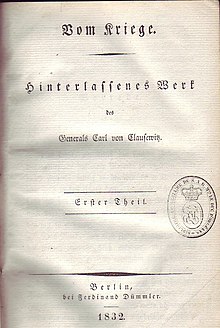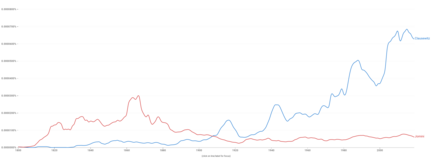
A pretty readable Google translation of the Russian Wikipedia article on Clausewitz (vers. 25 JUNE 2023)
Clausewitz, Carl von
Carl Philipp Gottlieb von Clausewitz ( German: Carl Philipp Gottlieb von Clausewitz ; June 1, 1780, Burg, Duchy of Magdeburg, Prussia - November 16, 1831, Breslau, Prussia) was a Prussian military leader, military leader, military historian and thinker. Major General (1818).
| Carl Philipp Gottlieb von Clausewitz | |
|---|---|
| German Carl Philipp Gottlieb von Clausewitz | |
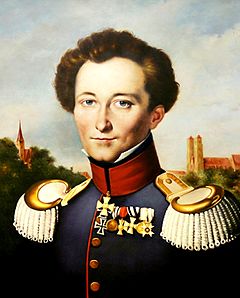
|
|
| Date of Birth | June 1, 1780 |
| Place of Birth | Burg, Duchy of Magdeburg, Prussia |
| Date of death | November 16 , 1831 (aged 51) |
| A place of death | Breslau, Prussia |
| Affiliation | |
| Type of army | infantry, General Staff |
| Years of service | 1792-1831 |
| Rank | major general |
| Battles/wars | |
| Awards and prizes | |
Biography
Early years
Karl von Clausewitz was born in the small town of Burg near Magdeburg in the family of an excise official, Friedrich Gabriel von Clausewitz (1740-1802). In Burg he attended the local Latin school. Karl's father participated in the Seven Years' War and had the rank of lieutenant. The family considered itself (probably unfairly [1] ) to the Upper Silesian nobility, but its noble origin was in question. Only in 1827 did Clausewitz receive documents confirming his noble status.
In 1792 (at the age of 12) Clausewitz was enlisted as a cadet in Prince Ferdinand's 34th Infantry Regiment. At the end of January 1793, together with the regiment, he arrived on the banks of the Rhine to participate in the war against revolutionary France. Been on fire in a series of skirmishes with the French during the Siege of Mainz. On June 6, he was promoted to the first officer rank of ensign (Fähnrich) and on July 23 he witnessed the fall of the fortress. In the spring of 1795, Clausewitz's regiment was stationed near Osnabrück. Not having serious official duties, the young man became interested in reading. In 1795-1801 he continued to serve in Neuruppin (near Berlin). With the rank of lieutenant, he participated in the classes of the regimental school organized by Colonel F. W. A. von Chammer. Chammer's review of the young officer dates back to this time: "An excellent young man, useful and zealous in his service, intelligent and looking for opportunities to acquire any kind of knowledge."
In 1801-1804, Clausewitz studied at the Institute of Military Sciences for young infantry and cavalry officers (the future Military Academy ), organized by Colonel G. von Scharnhorst. In the course of his studies, he became close to the latter and fell under his influence, which became decisive in his career and theoretical activity. He joined the Military Society organized by this military reformer. The key influence of Scharnhorst on Clausewitz was a critical attitude towards the philosophy of the Enlightenment - its methods of scientific knowledge, including in the military field. The first serious works of the young officer belong to this period: a description of the campaigns of Gustav II Adolf 1630-1632, a critical review of the writings of Bülowand some others. In 1803, Clausewitz was appointed adjutant to Prince August (cousin of King Frederick William III ), and a year later he graduated from the Institute first in success.
Service under Prince August gave Clausewitz the opportunity to enter court circles. In this society, in December 1803, he met Countess Maria von Brühl. At the end of 1805, they opened up to each other in feelings. Maria came from an aristocratic family that occupied a high position in society. Her mother allowed her to correspond with Clausewitz, but opposed the wedding because the groom did not have the required lineage, fortune, or position in the service.
1806 and reforms
In 1806, Clausewitz served under Prince August during the Prussian war against Napoleon. Participated in the unsuccessful battle for the Prussians at Jena and Auerstedt. Together with Prince August, he tried to organize the battle of three grenadier battalions near Auerstedt, then took command of one of them. During the retreat after the battle, he joined the army of Hohenlohe. On October 28, near Prenzlau, together with the prince, he was captured by the French.
At the end of 1806, Prince August and Clausewitz followed to France as prisoners. On rather free terms, Charles stayed in Nancy, then in Soissons. In addition, he spent three weeks in Paris. At the end of July 1807, after the conclusion of the Peace of Tilsit, the captives received permission to return to Prussia. On the way, Clausewitz spent two months in Koppe (near Geneva ) visiting Madame de Stael, where he talked with Madame Recamier, August Schlegel, Pestalozzi and others. In November 1807 he returned to Berlin and then left for the court, which was in Königsberg. The result of the forced journey was Clausewitz's work on the national character of the French and Germans and on Pestalozzi's pedagogical system.
Since 1808, Clausewitz took part in the Prussian military reforms, entering the circle of confidants of their author Scharnhorst. In February 1809 he was appointed at the disposal of the Minister of War and promoted to captain. He helped in compiling notes and letters, maintaining journals of meetings, compiled summaries of military news. In the autumn he was appointed head of the office of the Minister of War, in the following 1810 he was enrolled in the General Staff and in the Military School. Under the direction of Scharnhorst, he participated in the development of methods of staff work and taught strategy and tactics to future staff officers. In February 1811, he was appointed to the commission for the preparation of infantry and cavalry charters. In addition, in October 1810 he began classes in military art with Crown Prince Friedrich Wilhelm. These lessons will be reflected in the work "Principles of War".
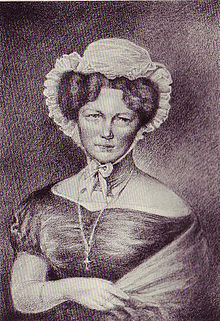
On December 17, 1810, Clausewitz married Countess Maria von Brühl. For many years, the couple maintained a warm relationship that mentally enriched them both. His own spiritual aspirations and communication with his wife brought Clausewitz to the center of German intellectual and artistic life at the beginning of the 19th century. He was greatly influenced by Machiavelli, Kant and Fichte, and appreciated Goethe and Schiller. The Clausewitz couple communicated with philosophers Fichte, Schleiermacher, scientist Wilhelm von Humboldt, poet Arnim, publishers Heinrich von Kleist and Adam Müller, lawyer Savignyand others. Like many contemporaries, Clausewitz tried to comprehend the phenomenon of Napoleon, the Prussian catastrophe of 1806 and the place of the German nation in Europe. Clausewitz was convinced that Prussia should challenge Napoleon and lead the other Germans. Back in April 1809, he unsuccessfully tried to transfer to the Austrian service in order to take part in the campaign of 1809. After the failure, he looked for an opportunity to take part in the British campaigns in the Pyrenees. Focusing on the experience of the Spaniards, Clausewitz began to advocate the opening of guerrilla warfare.against the French throughout Germany. However, King Frederick William III did not live up to the hopes of the reformers: the transformations were slow, Prussia was firmly in the orbit of Napoleon's empire, and in 1810 the monarch was forced to submit to pressure from the French emperor and remove Scharnhorst.
1812
When Prussia entered into an alliance with France in early 1812, Clausewitz left the Prussian service. In February, he compiled a note known as "Confession" ( Bekenntnisdenkschrift ). In this document, the Prussian officer protested against the pro-French policy of the monarch. Emphasizing that "the king is the representative of the nation", he denied the absolute nature of his power and the need for unconditional loyalty. Moreover, Clausewitz denied the existence of a conflict between the duty of a loyal subject and the duty of an honest man: both required resistance to French domination. The last part of the Confession spoke of the moral and political necessity for Prussia to fight against Napoleon, up to and including a general uprising to overthrow foreign domination.
On March 31, 1812, Major Clausewitz left Berlin, and on April 18 he formally resigned. On May 20, he arrived at the headquarters of Alexander I in Vilna and entered the Russian service. With the rank of Lieutenant Colonel of the Suite in the quartermaster unit, he was sent to the disposal of General K. von Pfuel and took part in the war of 1812.
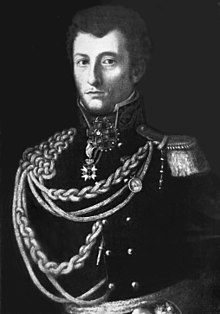
Clausewitz was sent to assess the state of the Drissa camp. Finding this camp unsatisfactory, he reported this to the Russian emperor, contributing to the decision to leave this position. Soon he was appointed chief of staff of the rearguard of the 1st Army, then as an officer of the headquarters of the 1st Army and, with the arrival of Kutuzov, chief of staff of the corps of Count F. P. Uvarov. In the latter capacity, he participated in the Battle of Borodino, was with the troops during the Platov-Uvarov raid. Not knowing the Russian language and experiencing the mistrust of Russian bosses towards foreigners, he could not seriously influence events and played a passive role in them.
In mid-October, Clausewitz reached Saint Petersburg, from where he was to travel to Riga. However, instead, he joined the Russian-German Legion and became its chief of staff. Having no employment in this capacity, he was temporarily sent to the 1st Corps of P. H. Wittgenstein. On November 16-17, he arrived at a new duty station and participated in the pursuit of the French to the western borders of the Russian Empire. At the end of December, he participated in negotiations with the commander of the Prussian corps, Lieutenant General Count L. York von Wartenburg. He managed to convince the latter to leave Napoleon and go over to the side of the coalition. The decision was formalized in the Tauroggen Convention, the text of which (according to evidenceI. I. Dibicha ) was compiled by Clausewitz. In February 1813, he organized the East Prussian Landwehr, despite the fact that Prussia had not yet officially entered the war against France.
1813 and the Hundred Days
In March 1813, Clausewitz stopped briefly in Berlin, after which he traveled to Silesia, where the royal court was located. His request to be accepted back into the Prussian service was rejected by Friedrich Wilhelm III, whose entourage met the author of the Confession with emphatic coldness. Formally, Clausewitz was appointed Russian liaison officer at the headquarters of H. L. von Blucher, but in reality he acted as an assistant to Scharnhorst and A. von Gneisenau.
In May 1813, Clausewitz was at the headquarters of the Russian-Prussian troops. Was on fire during the battle of Lützen, where Scharnhorst was mortally wounded. Together with Gneisenau, he took part in the Allied decision to give another battle to the French at Bautzen. Again he was refused by the king in determining the Prussian service and was forced to accept the post of chief of staff of the corps of Count L. von Walmodena, which included the Russian-German Legion. On September 16, he participated in the successful defeat of the French column near Görde and was promoted to colonel. At the beginning of 1814, together with the Valmodena corps, he participated in the siege of Hamburgand entered the Netherlands in February. Pushed away from the main events, dissatisfied with his own role, suffering from toothache and arthritis, he thought about joining the Dutch service. However, on April 11, 1814, he was officially accepted back into the Prussian army (in August 1816, the period of service in the Russian army was counted in his seniority). For some time he commanded a brigade in the German Legion, and then the entire legion. In the summer he participated with his unit in the occupation of Hesse.
On March 30, 1815, he was transferred to the General Staff and then appointed chief of staff of the 3rd Army Corps (commander I. A. von Tilman ). He took part in the Hundred Days Campaign, which ended with the Battle of Waterloo. After the battle of Linyi on June 16, he spent the whole night in the saddle, leading the retreat of the corps. Helped organize the defense during the battle of Wavre. He was awarded the Iron Cross II class.
After Napoleon
After the final fall of Napoleon, Clausewitz continued to serve as chief of staff of the 3rd Army Corps ( Koblenz ), now commanded by Gneisenau. He not only performed ordinary staff duties, but also oversaw the introduction of universal conscription in the Rhineland, participated in the demarcation of the new Prussian-Dutch border.
After 1815, Clausewitz retained his former liberal aspirations and hope for a close alliance between the monarchy and the people. The corps headquarters was nicknamed " Wallenstein's camp " because both the commander and the chief of staff had a reputation for not being entirely trustworthy subjects. Although Charles sympathized with the idea of a constitution, in 1817 he refused to sign a petition reminding Frederick William III of his promise to grant it. Clausewitz considered such a petition to be too "democratic" a step, continuing to consider only reforms coming from above to be beneficial. Later, in unpublished works, he emphasized that military necessity requires the crown to have a close alliance with society and convene its representatives:
Prussia needs to arm all her people in order to resist the two giants who will not cease to threaten her from east and west. Should she fear her own people more than those two giants?[3]
In May 1818, Clausewitz was appointed head of the Military Academy in Berlin and promoted to major general. Before assuming his new duties, he temporarily served as commandant of Aachen during the congress held there. The beginning of work on the treatise "On War" dates back to this time. Arrived in Berlin on Christmas Eve. He was not satisfied with his new appointment, he considered the course at the academy too theoretical and divorced from practice. Little was engaged in the development of a military educational institution and unsuccessfully sought a transfer to the diplomatic service. Not satisfied with their position, seeing the strengthening of conservative tendencies (especially after the Carlsbad DecreesSeptember 1819), more and more went into theoretical work. In 1822 he was awarded the Order of the Red Eagle of the III degree, in 1828 - the same order of the II degree with oak leaves.
In the 1820s, Clausewitz, along with his wife, led an active social life, which was periodically interrupted due to health problems. On June 3, 1822, the general suffered a blow of an unclear nature, which temporarily paralyzed his right arm. In 1827 he was seriously ill, and his relatives feared for his life. By this time, there was an attempt to deeply rework the concept of the treatise "On War", which was not completed. A. Gat believed [4] that in 1827 Clausewitz experienced a deep crisis that forced him to break completely with his former military-theoretical convictions.
In early 1830, the king granted his request to be transferred to a military position. Clausewitz was appointed inspector of the 2nd Artillery Inspectorate. Some time after the outbreak of the July Revolution in France, he arrived in Breslau. In the atmosphere of the upcoming revolutionary crisis, he went against the prevailing sentiments in Berlin (as well as in St. Petersburg) and considered a preventive war with Paris too dangerous. At the same time, he regarded the situation as alarming and made assumptions in case of a new war against France. After the beginning of the November uprising in the Kingdom of Polandappointed chief of staff of the army formed on the eastern border, led by Gneisenau. Participated in meetings to assess the strategic situation of Prussia, which was threatened by a war on two fronts.
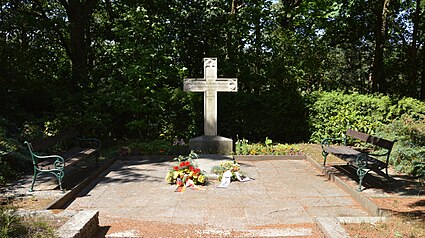
On March 7, 1831, Clausewitz left Berlin and arrived in Posen. He carefully observed the political events in France and the military actions of Dibich in the Kingdom of Poland, took quarantine measures against the spread of the cholera epidemic. On August 23, Gneisenau died of cholera. The general was deeply saddened by the death of his senior comrade and the insufficient attention of the court to his merits and family. His hope to at least temporarily remain at the head of the army also did not materialize when the appointment of K. F. von dem Knesebeck, a politically and personally unpleasant boss far from Clausewitz, followed. On November 7, the general returned to Breslau and on November 16 felt ill. On the same day he died of cholera.
Proceedings
Origin of ideas
In 1940, the researcher E. Hagemann proposed the idea of a "German science of war", which reflected the German national idea. He saw the beginning of this science in the intellectual quest of the Romantic period. German romantics opposed themselves to the traditions of the Enlightenment, exalted the role of the will and the importance of chance in a conflict, and emphasized the impossibility of creating a normative system of rules for such a conflict. Hagemann considered Clausewitz to be the embodiment of this romantic spirit. The Prussian thinker was placed in the context of other representatives of German military thought of the early 19th century - Scharnhorst, Berenhorst, Rühle von Lilienshtern and Lossau. These military writers were considered the forerunners of Clausewitz [5].
Most modern historians (P. Pare, A. Gat, B. Huizer, and others) follow this path and derive Clausewitz's military thought from the general cultural context of his era, primarily from the ideas of counter-enlightenment. In the 2010s-2020s, this tradition was criticized by the Polish researcher J. Jendrysiak, who pointed out that the interpreters were too carried away by Clausewitz's connections with the culture of his time and, partly due to the inaccessibility of archival documents, underestimated the importance of the strategic context. The menacing position of Prussia in the center of Europe had a greater influence on the minds of the military than any philosophical concepts and cultural trends [6].
Unlike contemporary military thinkers such as Archduke Charles, Jomini or Bülow, Clausewitz took a more realistic approach to military affairs. Dogmatism, the dominance of schemes, and speculative conclusions unverified by experience are rejected in his works. The theory of military affairs is put in line with the theory of art (for example, painting): in war, only the lower, handicraft part is available for research, and the higher part is the area of free creativity of a genius. Drawing up rules for waging wars is meaningless, because almost everything depends on a multitude of unknowns (the moral qualities of the troops, their condition, chance, etc.).
Clausewitz differs from other military thinkers in the depth of his insight into the issues of war. He did not seek to write a book on how to wage war in order to win. Rejecting the abstract thinking characteristic of the Enlightenment, Clausewitz moved closer to the emerging historicism. The methods of warfare depend on the specific conditions of the era, respectively, the war changes, and each era has its own type of armed conflict. Clausewitz was interested in what constitutes the unchanging essence of war, and he sought to separate it from what lies on the surface and is subject to change. He believed that the essence of the war came out brightly during the Napoleonic Wars.when the battle became the culminating and decisive event, and violence did not meet the traditional barriers. The methodical manner of waging war in the 18th century was a distortion of the essence of military affairs.
"1806"
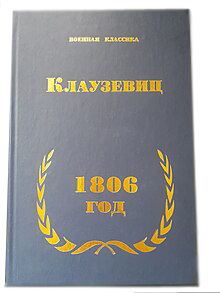
The history of the 1806 campaign was written by Clausewitz in 1823-1824, after which, in 1828, he revised the text after visiting the battlefield of Jena and Auerstedt. As planned, this work was to be the first step towards a more extensive work on the history of Prussia at the beginning of the 19th century. However, such work was never committed. Clausewitz used available German and French sources, but relied heavily on his own memories and communication with participants in the events. The inevitable inaccuracies in dates and calculus of the forces of the parties crept into the manuscript, but the characteristics of personalities and the assessment of errors give it great value. Unlike Clausewitz's other historical works, 1806 is subjective and polemical. The book was written to prove the inevitability of defeatFriedrich's Prussia and thus justify the reforms that followed after 1806. Since this work contained an undisguised criticism of the state of the Prussian kingdom and influential figures, it was not published until 1888 (Nachrichten über Preussen in seiner grossen Katastrophe).
"1806" was published in the USSR in 1937 and 1938, and then reprinted several times.
"Principles of War"
The Principles of War is the most striking and important work of the early Clausewitz. From 1810-1812 he taught military arts with Crown Prince Friedrich Wilhelm. Leaving Prussia in April 1812, Clausewitz sent an essay to his student, which was a consolidated reading course. A characteristic feature of the "Principles of War" is the emphasis on the moral factor, bold and aggressive actions.
In Russia, "Principles of War" was first published in 1888 in the translation of General M. I. Dragomirov, with his preface and comments. Dragomirov worked with the French translation of Clausewitz, and his transcription was then checked against the German original by General M. A. Gazenkampf. Like many contemporaries, the Russian translator believed that “[in] this note is the core of the entire Clausewitz system” [7]. However, for all the similarities with certain places from the treatise "On War", this early work still differs from the main work of the Prussian military thinker. In the Principia, Clausewitz appears to be much more offensively oriented than in his later work. "On War" recognized the advantage of defense over the offensive. In editions of the 19th century, the treatise "On War" was often accompanied by "Principles of War", which were supposed to serve as a brief summary of an extensive philosophical work. As a result, Clausewitz's teaching was distorted and presented as more aggressive and resolute than it really was. In 1889, the "Principles of War" with comments by Dragomirov was published in French and contributed to the growth of interest in Clausewitz in France.
Subsequently, the translation of L. A. Igorevsky, made from the English translation by G. von Gatzke, spread in Russia.
"Confession"
On February 16, 1812 (or a few days before that date), Clausewitz drew up a note known as "The Confession" (Bekenntnisdenkschrift). The compilation of this document was connected with the conclusion of the Franco-Prussian alliance and the decision of the author to leave the Prussian service. The manuscript was in circulation among the supporters of the reforms. The "Confession" was divided into three parts: a call for resistance to the French, a political review of the position of Prussia, and an assessment of the kingdom's ability to wage war.
• I deny the empty hope of being saved by chance.
• A gloomy expectation of the future that dulled sensibilities refuse to acknowledge.
• The childish hope of softening the tyrant's wrath by voluntary disarmament, by winning his confidence through cowardly submission and flattery.
• The false submissiveness of a repressed intellect.
• A foolish distrust of our God-given abilities.
• Sinful neglect of any responsibility for the common good.
• Shameful sacrifice of every honor of the state and people, every personal and human dignity.
• I believe and confess that people value nothing more than the dignity and freedom of their existence.
• That you should protect them to the last drop of blood.
• That there is no higher duty to perform, no higher law to obey.
• That the stain of cowardly submission will never be washed away.
• That this drop of poison in the blood of the nation will be passed on to offspring, crippling and destroying the strength of future generations.
• That the honor of the king and the government is one with the honor of the people, and the first is the only guardian of the people's well-being.
• That even the destruction of freedom after a bloody and honest struggle ensures the rebirth of the people.
— Clausewitz C., von. Historical and Political Writings. Ed. by P. Paret and D. Moran. Princeton: Princeton University Press, 1992. P. 290.
"1812"
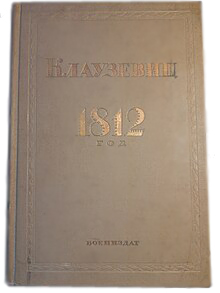
The manuscript of the 1812 campaign was written by Clausewitz intermittently from 1814 to 1823. He probably intended to create an analytical study of the campaign and his own memoirs about it. In 1823-1825, not fully realizing his plan, Clausewitz compiled a single manuscript from various disparate fragments. The essay was of great interest, thanks to the well-aimed characteristics of the characters and their relationships, a detailed description of the role of Pfuel and the history of the camp on Drissa, an analysis of Napoleon's strategic decisions, an assessment of the results of the Battle of Borodino and Kutuzov's ordersin this fight. In 1835 a history of the campaign of 1812 was published, with Clausewitz's manuscript heavily edited by the editor. Many attacks on individuals were softened and large fragments of the original text were thrown out [8]. The manuscript of this work is kept in the collections of the University of Münster.
In 1937, under the editorship of divisional commander A. A. Svechin, a translation of the history of the campaign was published in the USSR, made by A. K. Rachinsky and M. I. Protasov. The edition was accompanied by several letters from Clausewitz to his wife and was then repeatedly reproduced.
"Vom Kriege"
Clausewitz's main work is the extensive treatise On War, which was published by his widow in 1832-1834. In 1853 the second edition of the treatise was published.
"On War" consists of eight books (parts):
- Book I. The Nature of War
- Book II. Theory of War
- Book III. General questions of strategy
- Book IV. The battle
- Book V. Armed Forces
- Book VI. Defense
- Book VII. Offensive
- Book VIII. war plan
In Book I, Clausewitz put forward several starting points for his study of war: the centrality of violence, which is held back by friction, a resisting adversary, and political goals. The nature of war is described by a "trinity" which is recorded in chapter 28 (book I). In a condensed form, these starting points can be represented as follows:
Violence. Violence is at the center of war, and war is fought to force the enemy to do his will. The wager of a war has an interest in maximizing violence and depriving the enemy of the opportunity to resist. However, such absolute war does not actually occur.
Friction is one of the reasons why absolute war is impossible. The flaws of human nature and many accidents lead to a gap between design and implementation.
Defense. The enemy fights back and takes his own steps. Defensive actions give him the opportunity to delay the denouement of hostilities.
Politics. War is a continuation of politics, only by other means. War is subject to political aims that lead to the limitation of its absolute nature.
Trinity. Thus, war is an “amazing trinity”, which consists of 1) violence and passions (the area dominated by blind instinct), 2) probability and chance (the area of human activity), 3) the subordination of war to politics (the area of reason). The three elements correspond to the three forces operating in the war - the people, the army (commander) and the government.
In the opening chapters, Clausewitz portrays the nature of war as absolute and unrestrained violence. But in subsequent chapters, a completely different understanding of war is put forward - as an instrument of politics. This contradiction puzzled many readers of On War and gave Clausewitz a reputation as a nebulous thinker with ideas incomprehensible. As he completed Book VIII in 1827, Clausewitz realized the one-sidedness of his approach. He stopped insisting that the strategy of crushing is higher than the strategy of limited action, and began to revise Book I in the corresponding spirit. The revision of the concept was not completed until the death of the thinker, as a result of which the treatise has internal contradictions [9 ].
After the unsuccessful translation of "On the War" into Russian by General K. M. Void (1905), in 1934 a translation by A. K. Rachinsky was published, edited by A. A. Svechin.
Posthumous reputation
In a simplified way, the history of Clausewitz's legacy can be seen as a movement from oblivion in the 1830s-1860s to recognition and cultization in 1880-1914, then from criticism in the 1920s-1940s to a revival of interest and reverence during the Cold War era.
First Readers
When "On War" was published in 1832-1834, the book did not make much of an impression. Partly because of the depth of its research, partly because of its incompleteness, it has gained a reputation as a heavy and obscure philosophical treatise for the elite, which will do little to help the future general to understand the basics of his trade. Somewhat later, the French military writer Y. Kamon noted that the reader of the treatise "is in a metaphysical fog." However, in a narrow circle of specialists, the work was met rather favorably. Another Prussian-Swiss theorist W. von Rustow noted that "Clausewitz is often quoted, but read very rarely" [10].
Clausewitz remained virtually unknown outside of military circles. K. Marx and F. Engels were among the first among political thinkers to pay attention to it. The latter highly appreciated "On the War", which was of great importance for the fate of the legacy of the Prussian thinker in the communist countries. Clausewitz appears as an episodic character in Leo Tolstoy's novel War and Peace (1865-1869). Y. Kamon suggested that the writer borrowed the characteristics of the generals from Clausewitz's book "1812".
Clausewitz remained practically unknown in France for a long time due to the language barrier and competition with the Swiss A.-A. Jomini, an established Francophone military theorist. The first translation of "On the War" into French was made in Belgium in 1849-1851 by Major Neuens. But the appearance of the French edition did not become an impetus for the popularization of Clausewitz, and the influence of the Prussian thinker remained negligible west of the Rhine.
One of Clausewitz's early preachers in the English-speaking world was the British officer J. Mitchell, but his efforts dating back to the 1830s and 1840s were in vain. Jominy had a strong hold on the minds of the British and American military, and at the American military academy at West Point, the Jominist tradition was especially strong.
Among military intellectuals in Russia, Clausewitz quickly became a revered author. Baron N. V. Medem included the work "On War" in his "Review of the most famous rules and systems of strategy" (1836) and gave him a high rating. However, in Russia, as in other countries, the authority of Jomini suppressed competitors. Towards the end of the 19th century, strategic discussions were dominated by the name of G. A. Leer, whose works also did not contribute to interest in the Prussian thinker.
Studies of references to Clausewitz and Jomini clearly show that until the 1870s, the Prussian theorist was almost invisible against the background of his Swiss competitor. The graphs of the frequency of mentions of the two thinkers in English-language literature intersect only around 1914, and the 20th century has already passed under the complete dominance of Clausewitz [11].
Raising to a cult
In 1870-1871, Prussia won the Franco-Prussian War, which was of great importance for the fate of Clausewitz's legacy. In the 1870s, and especially in the next decade, there was a tendency to present him as the forerunner of Prussian victories and the founding father of German military art. The rise of Clausewitz was due to the fact that Moltke the Elderopenly admitted that "On the War" had a great influence on him. “Clausewitz is our immortal great teacher,” wrote General W. von Blume in 1882, “who in a clear and distinct form showed us what an important role combat plays in war, and this protected us from erroneous theories. He owns most of the successes that have been achieved in recent years by the strategy and the German armies. A number of German military writers have referred to Clausewitz as a classic of military thought, or clearly followed in his footsteps. Especially, this applies to A. von Boguslavsky, S. von Schlichting, H. von Freytag-Loringofen and R. von Kemmerer. Historian H. Delbrück, relied on the theoretical developments of Clausewitz, defending the legitimacy of a war of attrition as opposed to crushing.
Already in 1873, the first English-language edition of "On the War" appeared (translated by British Colonel J. Graham). However, the arrangement did little to spread Clausewitz's ideas in Great Britain and the United States. It was not until the 1890s that Lieutenant Colonel J. F. R. Henderson began to promote the German thinker at the British Staff College, Camberley. An explosion of interest in Clausewitz in Great Britain occurred in the decade between the Boer War and the outbreak of the First World War. In particular, the Prussian writer had a significant influence on J. Corbett, the most important British theorist of naval strategy.
After its defeat in the Franco-Prussian War, the French army went through a period of imitation of German models. In the 1880s, the influence of Clausewitz was felt among many of the military minds of France, such as those of L. Cardot, J. Gilbert, L. Maillard and A. Bonnal. In 1885, Major Cardot lectured on Clausewitz at the French Military School, and in 1886-1887 a new translation of the thinker into French appeared by Lieutenant-Colonel de Vatry. There was skepticism among the French about Clausewitz. Y. Kamon put forward the idea that the Prussian writer did not understand Napoleonic military art. B. G. Liddell Hart suggested that Clausewitz had a decisive influence on the authors of the aggressive doctrine offensive à outrance(“offensive at all costs”), which was adopted in France on the eve of 1914.
Interest in Clausewitz in France originated not without the influence of General M. I. Dragomirov, who also popularized the Prussian thinker in Russia. However, Clausewitz's influence was held back there by Leer and his students, who developed a more scientific theory of the art of war. In 1905, the first edition of "On the War" appeared in Russian (translated by General K. M. Void ).
Until 1914, Clausewitz was understood as the prophet of a strategy of crushing that produced brilliant results in the wars of German unification. His name was associated with offensive strategic and tactical doctrines, the primacy of the will in war - common ideas in the military environment of the 19th and early 20th centuries. Clausewitz's direct statements about the superiority of defense over offense were ignored.
Criticism after World War I
The First World War led to the discrediting of the former offensive views of the European military. Accordingly, Clausewitz's credibility as a military thinker suffered. The author of "On War" was now seen as the " Mahdi of the masses" ( B. G. Liddell Garth's definition ) who infected the warlords with an offensive spirit, who in turn led an entire generation to the horrors of world war, poison gases, and the hecatombs of the dead. E. Ludendorff's book "Total War" (1935) also dealt an indirect blow to Clausewitz's reputation. In this work, Clausewitz's formula "war is the continuation of politics" was turned on its head: Ludendorff foretold that in "total wars"the political sphere will be subordinated to the war effort. Although this thesis did not at all correspond to the content of the treatise "On War", Clausewitz became, as it were, a herald of German militarism.
In the United States and Western Europe, interest in the author of "On War" noticeably weakened. Clausewitz was beginning to be understood more as a figure of historical interest than as an actual military or political thinker. In 1918, the historian H. Rothfels defended his dissertation "Karl von Clausewitz: politics and war." The work was published as a separate book in 1920, becoming for many years the most authoritative biography of the Prussian military thinker. In a 1943 article aimed at an English-speaking audience, Rothfels tried to present Clausewitz as a less primitive writer than Liddell Harth's work [12] suggested. In 1935, B. Croce published the article "Action, success and judgment in Clausewitz's On War", for the first time proposing to consider the treatise as a philosophical work.
In the Third Reich, Clausewitz continued to be regarded as a contemporary military thinker and exponent of the German spirit. A. Hitler used quotes taken out of context to confirm his theses and present himself as a successor to Prussian military traditions. In addition, fruitful study of the biography of Clausewitz continued in Nazi Germany through the efforts of V. M. Schering and E. Hageman. Schering stated that Clausewitz is "on the same level with Goethe and Schiller, with Kant, Fichte and Hegel " [13]. On the eve of the new year 1944, Clausewitz's "Confession" was read to the Germans on the radio right before the Fuhrer's New Year's address. Despite outward reverence, the degree of Clausewitz's influence on the creators of the Wehrmacht remains in question. Thus, Field Marshal E. von Kleist admitted that his generation neglected the study of his ideas [14].
IN THE USSR
Thanks to the respect that Engels and Marx had for Clausewitz, interest in the Prussian theorist always remained among the communists. V. I. Lenin read "On the War" during the First World War, made extracts from the treatise, referred to Clausewitz and recommended reading it to his associates. In May 1918, the Bolshevik leader used the authority of Clausewitz, urging critics of the Brest-Litovsk Peace Treaty to "take the defense of the country more seriously" [15].
The Prussian military theorist remained an important source of inspiration for the builders of the Red Army. In 1924, A. E. Snesarev wrote a short biography of Clausewitz, intended as an introduction to his translation of the treatise On War. “It is especially useful for us these days to remember Clausewitz,” Snesarev noted. - Having survived the world and civil wars, having spiritually separated them, as something deeply different, as a result, having not studied and studied neither one nor the other, we, just as it was in the years after Napoleon, are sailing on a boat of phrases, hypotheses, construction of theories, although we call them by other names" [16]. However, Snesarev failed to publish "On the War" or a biography of Clausewitz (the biography was published only in 2001). A. A. Svechin played a significant role in popularizing the Prussian thinker in the USSR. He owned the editorial work of the Soviet edition "On the War" (1934), as well as some other works of Clausewitz. In 1935 he published his biography of Clausewitz in the series The Lives of Remarkable Men. Svechin regretted the idealism of the author of "On War" and his reactionary monarchism, but recognized him as a deep researcher. Being a supporter of the strategy of starvation, the Soviet divisional commander especially emphasized the recognition by the Prussian military philosopher of the advantages of defense.
In 1938, Mao Zedong read On War, and the book greatly influenced his political thinking and the theory of guerrilla warfare.
JV Stalin considered Clausewitz to be part of the hostile tradition of German militarism. In 1944, the Soviet press sharply criticized the Prussian military theorist, and in July 1945, a critical article by Lieutenant Colonel G.P. Meshcheryakov appeared in the journal Military Thought, entitled Clausewitz and the German Military Ideology. Military historian Colonel E. A. Razin expressed doubts about the thesis of the article, pointed out the high assessment of Clausewitz by Engels and Lenin, and turned to Stalin for clarification. The leader responded to Razin with a public letter and urged to critically perceive German military thought, remembering that Lenin exalted the political (but not military) side of Clausewitz's works [17]. In accordance with Stalin's guidelines, the neutral article about Clausewitz [18] in the 1st edition of the Great Soviet Encyclopedia (1938) was replaced by an abusive article [19] in the 2nd edition (1953). Clausewitz was declared "the largest representative of the German reactionary military ideology." The opportunity to revise these assessments opened up only after the criticism of Stalin at the Twentieth Congress (1956).
However, during the era of the Cold War in the USSR, no attempt was made to deeply analyze the theories of Clausewitz. In the 1960s and 1980s, there were discussions about the rationality of a possible nuclear war, in which the formula of war as a continuation of politics was spelled out. But the name of its author was rarely even mentioned.
Renaissance
After World War II, a new round of interest in Clausewitz began in Western countries. The Prussian military thinker has returned as a topical author for understanding contemporary political and military issues. The explosion of interest in him in the United States, West and East Germany, as well as in other countries, was accompanied by an expansion of the scope of Clausewitz's theoretical thought. His name began to be used for philosophical and sociological works and even for business manuals. On the other hand, the popularization of Clausewitz led to the "dominance of the formula" [20], when the versatile theory set forth in "On War" was reduced to the aphorism "War is the continuation of politics by other means."
The United States became the new leader in research on Clausewitz and his legacy. Thanks to the efforts of B. Brody, G. Kahn and their colleagues, in the 1950s, the importance of Clausewitz for understanding modern military-political problems began to be emphasized. Clausewitz's ideas became inseparable from the development of American strategy and foreign policy in the nuclear age. Two questions were at the center of the discussions. First, nuclear weapons called into question the Clausewitz formula, because war no longer looked like a rational means of conducting politics. Secondly, the threat of nuclear war made conflicts localized and limited, which also needed to be explained in light of the fact that Clausewitz was still perceived as an absolute war theorist.
Participants from other NATO countries gradually became involved in the discussions that were going on in the USA. In Germany, the problems of the nuclear age were superimposed on the legacy of the two world wars. For the Germans, it was important to tear Clausewitz away from German militarism and return him to the mainstream of the liberal democratic tradition. In 1952, a new critical publication “On the War” was published in German by W. Galweg, the most authoritative specialist on Clausewitz in post-war Germany. In 1961, the Clausewitz Society was created in West Germany, which united mainly staff service officers. In 1971, the GDR authorities organized the transfer of the remains of Clausewitz and his wife from Wroclaw, Poland, to Burg.
In France, Clausewitz enjoyed the attention of the leftist intelligentsia rather than the military or politicians. So, a new French translation in 1955 was made by D. Naville, close to Trotskyism. But the "left tilt" in the study of Clausewitz in French quickly faded away. Philosophers E. Weil, A. Glucksmann and R. Girard and sociologist R. Aron showed attention to his works.
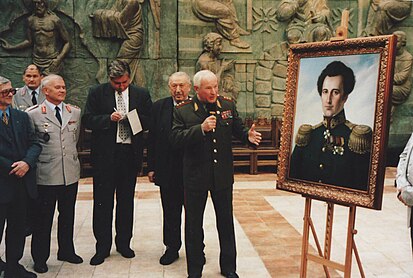
Interest in Clausewitz increased even more after the Vietnam War, when it became clear that the ideas of the Prussian military thinker provided a convenient starting point for analyzing US failures. This was most spectacularly demonstrated in the book by Colonel G. Summers on the defeat in Vietnam [21]. "On War" gradually became required reading for students at the Naval War College (1976), the Air Force War College (1978), and the US Army War College (1981).
1976 can be considered the culmination of Clausewitz's "revival". Firstly, this year a fundamental translation of "On War" into English, made by P. Pare and M. Howard, was published. Secondly, an influential book about Clausewitz by the French sociologist R. Aron appeared. In it, he tried to fit the Prussian military thinker into the debate about the nature of international relations that took place in the 1950s and 1970s. Aron gave Clausewitz an intellectual polish that testifies to his relevance to the study of political relations. Thirdly, the biography of P. Pare, Clausewitz and the State, was published, which is recognized by many as the best work on the military thinker. Pare showed not only the main life milestones of his hero and the origins of his ideas, but brought to the fore the special attitude of Clausewitz to the state. According to the biographer,
Authoritative historians M. van Creveld and J. Keegan criticized Clausewitz and the enthusiasm for applying his theories to the modern world. Local conflicts acquire an asymmetric character when the state collides with a non-state actor (gang formation, party, religious group). Van Creveld believed that thinking in the spirit of "trinitarian" wars (based on Clausewitz's trinity) was no longer applicable under such conditions. J. Keegan considered Clausewitz a dangerous philosopher, because his "political philosophy underlies the totalitarian state" [14]. Most Clausewitz scholars reject both of these lines of criticism.
Bibliography
- Clausewitz K. On War = Vom Krieg / Translated from German by A. K. Rachinsky. — In 8 volumes. - M. : Gosvoenizdat, 1934. - 692 p.
- Clausewitz K. 1806 = 1806 krieg / Translated from German. - M. : State Publishing House of the People's Commissariat of Defense of the USSR, 1937. - 227 p. — (Monuments of historical literature). Archived August 7, 2020 at the Wayback Machine.
- Clausewitz K. 1812 = Der Feldzug von 1812 in Russland / Translated from German by A. K. Rachinsky. - M. : State Publishing House of the People's Commissariat of Defense of the USSR, 1937. - 271 p. — (Monuments of historical literature).
- Clausewitz K. 1799 = Die Feldzüge von 1799 in Italien und der Schweiz / Translated from German. — In 2 volumes. - M. : Gosvoenizdat, 1938. - 688 p. — (Monuments of historical literature). Archived August 12, 2020 at the Wayback Machine.
- Clausewitz K. Principles of warfare = Grundgedanken über Krieg und Kriegführung / Translated by L. A. Igorevsky. — M.: Tsentrpoligraf, 2009. — 228 p. - (Chronicles of military battles). - ISBN 978-5-9524-4349-5.
- Carl von Clausewitz, Hans Delbrück, Alfred von Schlieffen, Albert von Boguslavsky, Helmuth von Moltke, Charles V of Habsburg, Wilhelm von Scherff, Dietrich von Bülow. German military thought / Translator and compiler K. A. Zalessky. — M.: Astrel, 2013. — 674 p. - (Classics of military art). — ISBN 5457233898. — ISBN 9785457233898.
Sources
- ↑ Paret P. Clausewitz and the State: The Man, His Theories, and His Times. — Princeton, Oxford: Princeton University Press. - S. 14-15.
- ↑ Paret P. Op. cit. - S. 255-303.
- ↑ Quoted in: Clausewitz C., von. Historical and Political Writings / Ed. by P. Paret and D. Moran. - Princeton: Princeton University Press, 1992. - P. 290.
- ↑ Gat A. A History of Military Thought: From the Enlightment to the Cold War. - Oxford: Oxford University Press, 2001. - S. 219-220.
- ↑ Jędrysiak J. Prussian Military Thought 1815-1830: Beyond Clausewitz. - Brill, 2020. - P. 5-6.
- ↑ Jędrysiak J. Op. cit.
- ↑ Dragomirov M. Clausewitz's doctrine of war. Basic provisions. - St. Petersburg., 1888. - S. 1.
- ↑ Clausewitz C., von. Historical and Political Writings / Ed. by P. Paret and D. Moran. - Princeton: Princeton University Press, 1992. - P. 110.
- ↑ Gat A. Op. cit. - S. 225-228.
- ↑ Heuser B. Reading Clausewitz. - London: Random House, 2002. - S. 20.
- ↑ Bassford C. Jomini and Clausewitz - Their Interaction.
- ↑ Rothfels H. Clausewitz // Makers of Modern Strategy. Ed. by Edward Mead Earle (Princeton, 1943). — 1943.
- ↑ Heuser B. Op. cit. - S. 20.
- ↑ 1 2Jump back: Heuser B. Op. cit. - S. 22.
- ↑ Lenin V. I. On “left” childishness and petty bourgeoisness.
- ↑ Snesarev A. E. Life and works of Clausewitz. - M., 2007. - S. 229.
- ↑ Stalin I.V. Answer to Comrade Razin.
- ↑ Clausewitz, Karl. TSB1.
- ↑ Clausewitz, Karl. TSB2.
- ↑ Durieux B. Clausewitz et la reflexion sur la guerre en France, 1807-2007 Positions de thèse // Stratégique. - 2009. - No. 5-6 (N ° 97-98). - S. 229.
- ↑ Summers HG On Strategy: A Critical Analysis of the Vietnam War. — New York: Random House, 1995.
Literature
- Books
- Svechin A. A. Chapter Four. The Prussian army of the era of German unification // Evolution of military art. - M. - L.: Voengiz, 1928. - T. II.
- Svechin A. A. Clausewitz. - illustration.. - M. : Journal and newspaper association (ZhurGaz), 1936. - 288 p. - ( The life of wonderful people ). — 40,000 copies. Archived July 4, 2020 at the Wayback Machine
- Snesarev A. E. "The idea of revenge and national honor... will be the core of his persistent desires": The life and works of Karl von Clausewitz // Military History Journal. - 2003. - No. 1-3.
- Fabian F. Pen and sword: Karl Clausewitz and his time / translated by V. Ya. Golant. - M. : Military Publishing House, 1956. - 310 p.
- Heuser Beatrice Reading Clausewitz. - Glazgow:Random House, 2011. - 256 p. —ISBN 1448113954. —ISBN 9781448113958.
- Parkinson Roger. Clausewitz: A Biography. - Cooper Square Press, 2002. - 362 p. — ISBN 1461664500. — ISBN 9781461664505.
- Murray Stewart Lygon. The Reality of War: A Companion to Clausewitz (English). - Glasgow: Good Press, 2019. - 264 p.
- Paul Roques. Le generalal de Clausewitz. Sa vie et sa théorie de la guerre (French). - P. : Editions Astrée, 2013. - ISBN 979-10-91815-01-7.
- Strachan Hew, Herberg-Rothe Andreas. Clausewitz in the Twenty-First Centuryt. - Oxford:Oxford University Press, 2007. - 334 p. —ISBN 0191647624. —ISBN 9780191647628.
- Articles
- Boyarsky V.I. In defense of Clausewitz // Autonomous non-profit organization "Space and Time". - M. : Scientific Publishing Center "Space and Time", 2010. - No. 1. - S. 182-190. — ISSN 2226-7271. Archived from the original on March 5, 2021.
- Solntsev N.V. Karl Clausewitz and the Patriotic War of 1812 // Questions of History. - 2013. - No. 1. - S. 73-81. — ISSN 0042-8779. Archived from the original on September 19, 2020.
- Meerheimb Richard von de. Clausewitz, Carl von //Allgemeine Deutsche Biographie (ADB). — bd. 4. - Leipzig: Duncker & Humblot, 1876. - S. 285-296. (German)
- Smith George W. Clausewitz in the 1970s: Rx for Dilemma (English) // Military Review. - USA: Army University Press, 1972. - July (vol. 52,no. 7). —ISSN 0026-4148.
- Tiomain SO. Clausewitz: A Reappraisal (English) // Military Review. - USA: Army University Press, 1963. - May (vol. 43, no. 5 ). — ISSN 0026-4148.
- Clausewitz, Karl // Encyclopedic Dictionary of Brockhaus and Efron : in 86 volumes (82 volumes and 4 additional). - St. Petersburg., 1895. - T. XV. - S. 326.
- Clausewitz, Carl // [Cagliari - Coalition Wars]. - St. Petersburg. ; [ M. ] : Type. t-va I. D. Sytin, 1913. - S. 583-585. - ( Military encyclopedia : [in 18 volumes] / edited by K. I. Velichko ... [ etc. ] ; 1911-1915, v. 12).

